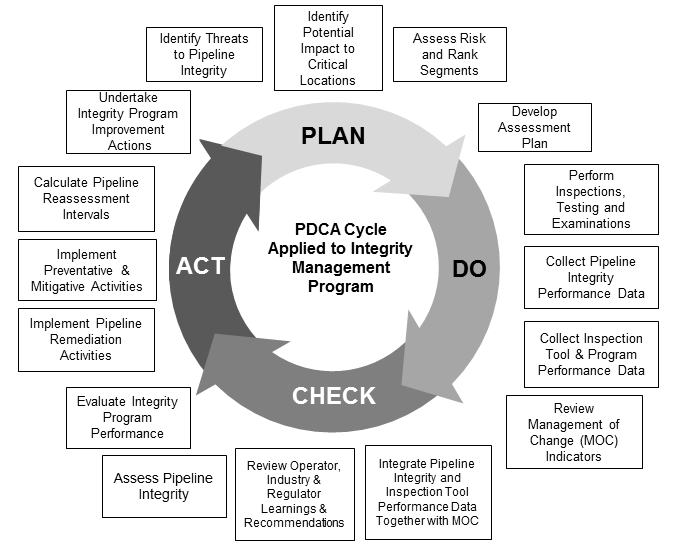Mission and Objectives
The goal of any operator is to maintain pipeline integrity to prevent adverse effects on the environment and the public, with the ultimate objective being zero incidents. The guidance in API Recommended Practice (RP) 1160, Managing System Integrity for Hazardous Liquid Pipelines, provides a framework for an effective integrity management program, which helps focus resources on prevention activities that effectively:
- identify and analyze actual and potential precursor events that can result in other incidents
- provide a comprehensive and integrated means for examining risk and selecting the appropriate activity to reduce risk
- establish and track system performance ensuring continuous improvement
Similar to API Recommended Practice (RP) 1173, API RP 1160 was developed by pipeline operators, for pipeline operators. While it is a tool for operators, external stakeholders, such as the public and the regulators, were engaged to receive feedback from all groups involved in the many aspects of pipeline integrity.
Certain guiding principles are fundamental for API RP 1160 and effective integrity management programs.
- Integrity should be a consideration in initial planning, design, and construction. The design, such as where the pipeline is routed, impacts the capability to inspect and maintain the pipeline. Also, properly installing the pipeline ensures there is no damage before operation even begins, and it is critical to know and document the as-built condition of the pipeline to establish the correct baseline information for an integrity management program.
- Effective integrity management is built on qualified people using defined processes. A comprehensive program needs to have plans in place to train people and processes for these individuals to follow, so their activities are routine.
- Information detailing risk to a pipeline system can come from a variety of sources, such as in-line inspection tools, direct assessment, and construction data, just to name a few. The integration of all this data is essential to properly managing system integrity. Operators must ensure they are collecting the appropriate details and analyzing it effectively to make prudent decisions to reduce these risks. This process of reviewing pipeline data and making informed decisions can vary with several methods available to assist operators. However, the ultimate goal is to identify and prioritize the most significant risks and implement measures to prevent incidents.
- As with API RP 1173, an integrity management program should be flexible to support each operator’s unique conditions, and it should be continuously evaluated. Design and operational changes can occur, possibly causing changes to the type of inspection method used or their frequency. Additionally, new and improved technologies are being developed, and operators need to adapt their integrity management programs to incorporate these advances. Obviously, operators will evaluate these new technologies before implementing to ensure it is effective, but if so, significant risk reduction may be available, as new widgets are helping better identify pipe flaws and critical data about the pipeline.
To ensure constant improvement through continual evaluation, integrity management programs have a “Plan-Do-Check-Act” cycle. An example of what an operator might do is shown below.
